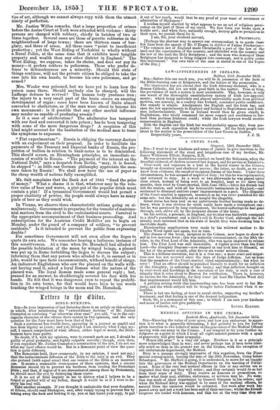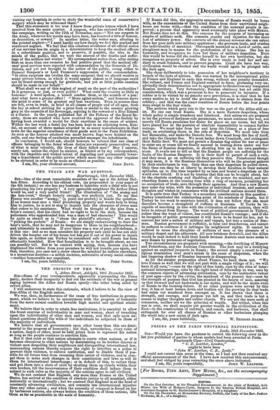MEDICAL OFFICERS IN THE CRIMEA.
Lerketh How, sttribleside, 7th December 1855.
Sm—Knowing the value of your space, and how you endeavour to appor- tion it to what is generally interesting, I feel grateful to you for having given insertion to two letters of mine on the grievances of the Medical Officers serving with our army in the Crimea. I am tempted to try your further in- dulgence on a point to which I trust all right-minded persons with a spark of generosity will give their sympathy.
" Ronos alit artes" is a very old adage. Nowhere is it as a principle more acknowledged than in war ; and never perhaps has it been more liber- ally acted on than in the present war in the Crimea, with the exception of one unfortunate department, the Medical. Here is a passage strongly impressive of this negation, from the Tiniss special correspondent, bearing the date of the 20th November, Camp before Sebastopol. " Mr. Stafford is going, it is understood, to move for an inquiry into the grievances of the Medical Department on the meeting of Parks- meat. Some of the very best medical officers in this or any service are so disgusted that they say they will retire; and they certainly would do so but from their sense of duty. They receive no honours or promotions, no matter what their zeal, abilities, endurance, or services may be. No men- tion was made of ,their department by General Simpson in his orders; and when Sir Richard Airey was applied to by some of the medical officers, he assured them the omission would be corrected. But week after week has passed away and not a word has been add of their services; whilst the Vrenah surgeons are loaded with honours, and this too at the very time they are visiting our hospitals in order to study the wonderful cases of conservative surgery which may be witnessed there."
That this statement is too true I know from private letters which I have received from the same quarter. A surgeon, who has endured the whole of the campaign, writing on the 12th of November, says—" Not one surgeon in the Army, whatever his merits may have been, has received a title of honour, or decoration, or reward." In another letter, the writer says, alluding to the pointed neglect—" I need hardly say how deeply we feel this marked and continued neglect. We feel that this constant avoidance of all official notice of our services has its origin in a determination to keep the medical officers in a subordinate position, and to preserve, if possible, the idea in the minds of the public, that we were the sources of the deaths and suffer- ings of the soldiers last winter." My correspondent writes thus, after stating that on more than one occasion he had positive proof that the medical offi- cers' good services were reported with commendation by the Generals of Di- visions, and yet not brought to the notice of the public, owing either to General Simpson's or Lord Panmure's suppression of the commendation. "It often surprises me (writes the same surgeon) that we should receive so many private letters, in which it would appear almost as if language could not be found strong enough for gratitude, and yet so little public exertion should be made in our behalf."
What shall we say of this neglect of merit on the part of the authorities ? Is it generous, or just, or even politic ? What costs the country so little as honours ! A word spoken, a breath confers them, or the scratch of a pen! And what have a greater effect ! "Mena agitat molem," and honours move the mind to some of its greatest and best exertions. Even in science they are felt, even in trade, in brief in all classes of people and of all ages, from the boy at school striving for a prize book or medal to the senator growing grey in the councils of his Sovereign, aspiring to the reward of a Blue Riband or a Garter. In the yearly published list of the Fellows of the Royal So- ciety, those are marked who have received the approval of the Society by having been awarded a medal for their exertions in the cause of science. Within the last week a festal day has been kept in an adjoining town, Ken- dal, on account of three medals awarded to as many manufacturers in that town for the superior excellence of their goods sent to the Paris Exhibition. As soon as the honour attained was made known flags were hoisted on the mills, and one feeling of exultation prevailed amongst the inhabitants.
In conclusion, I would ask, should honours be refused that one class of officers belonging to the Army whose duties:are expressly preservative, and of what is most valuable, the lives of their fellow men ? May I answer, surely not, unless the object be sinister, as hinted at by my correspondent, with the impolitic and wicked intent of degrading and permanently lower- ing a department of the public service which more than any other requires to be elevated in order to be made as efficient as possible.



































 Previous page
Previous page